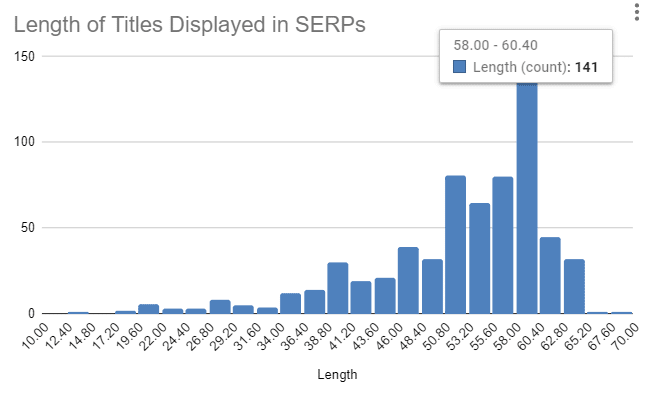The title tag is one of the most important SEO elements. It can have a great impact on your rankings. In my experience, optimizing title tags can give rankings a strong boost.
There are many different ways to approach optimizing a title tag.
One is making sure they fit within the 55-60 character limit. Though other SEOs suggest it’s okay to have title tags that are up to 70 characters long.
There are also concerns that getting the title truncated in search results or having it rewritten by Google can negatively affect organic performance.
In this post, we’ll explore the basis for such concerns, Google’s official statement about title length, and my findings after manually looking at 645 title tags on Page 1 of Google’s SERPs.
Example of title tag cut off in SERPs
Technically speaking, the number of characters for a title tag that Google can display in SERPs is measured in pixels. When your title tag is too long, Google can cut it off like this.

The title tag update and the aftermath
In August 2021, Google released an update aimed at title tags. This update enables Google to show a different title to users in SERPs than the one available in the HTML title tag.
HTML title tags may get rewritten in SERPs when they are:
- Too long.
- Stuffed with keywords.
- Missing or containing repetitive “boilerplate” language (i.e., home pages might be called “Home”).
Once the update was released, it caused an uproar in the SEO community as many SEOs have reported incidents where the title rewrite went “horribly wrong.” This even led Google’s John Mueller to tweet about it:
Rob Woods reported an incident where the title tag was replaced with the URL slug:

Chatter in the SEO community showed many examples of Google replacing <title> tags in the search results with alternative page elements like H1 tags, image alt texts, image file names, and sometimes the selected text was not even within the source code of the page. The most noticeable insight from the title tag update is that “Google wants shorter titles displayed in SERPs.”
This has caused some panic in the SEO community. Many SEOs started to double down on the importance of avoiding title rewrites by making sure their titles are short and within the character limit.
The confusion
It is clear to everyone that Google wants shorter titles in SERPs.
But does that mean they will use the titles displayed in SERPs (which may be potentially cut off or rewritten) for rankings instead of the HTML title?
This has led many SEOs to assume that longer titles will either get cut off or rewritten, and Google will not consider them for rankings but will consider the new title displayed in SERPs for rankings instead.
What is Google’s official statement about title length?
In a Search Off the Record episode, Google’s John Mueller asked Gary Illyes about title tag length:
“I have a question that is, maybe, just a yes or no thing, Gary. Is there a value in having <i>title</i> tags that are longer than the displayable space and the sections of it?”
To which Illyes gave a very clear and precise answer, “Yes.”
He added, “The <i>title</i> length, that’s an externally made-up metrics… Technically, there’s a limit, like how long can it be anything in the page, but it’s not a small number. It’s not 160 characters or whatever– 100, 200, 20, or whatever.”
And recommended to “Try to keep it precise to the page, but I would not think too much about how long it is and whether it’s long enough or way too long. If it fills up your screen, then probably it’s too long, but if it just one sentence that fits on one line or two lines, you’re not going to get a manual action for it.”
If we refer to Google’s documentation on SERPs titles (a.k.a., title links), there’s no recommended length for the title tag.
Would having longer titles impact rankings?
If longer title tags can get cut off or rewritten in SERPs, wouldn’t that impact rankings? Luckily, Lily Ray popped this question on Twitter and got this reply from Glenn Gabe.
This is what Mueller said in Google’s SEO Office Hours from Dec. 11, 2020.
So whether your titles get cut off or rewritten in SERPs, Google still uses the HTML title tag for ranking considerations and not the titles shown in SERPs.
My analysis
I want to put this argument to rest. Hopefully, as an industry, we stop recommending to clients to “shorten” their title tags for the sake of it – just because there’s been a title length metric circulating in almost all online resources on the topic with no facts or evidence to support it.
I put together a random set of keywords and analyzed the titles on Page 1 of the SERPs for each of those keywords.
Here are my findings after manually looking at 645 title tags:
- Google tends to display shorter titles. Out of the 645 titles displayed in SERPs that I analyzed, only 79 (12%) were above 60 characters, with 68 characters as the maximum length.
- Out of the 645 URLs, 286 URLs (22%) had HTML title tags longer than 60 characters, with 139 characters as the maximum length. This means you can go above the 60-character title length limit, get cut off or rewritten, and still rank on the first page.
- If we filter out pages that didn’t have any title tags at all, there were instances where Google actually increased the title tag length. So even shorter titles can get rewritten. This is very common in LinkedIn profile page titles. Example:
- For this URL [
https://ca.linkedin.com/in/michael-kuch-387740207] the HTML title tag was “Michael Kuch | LinkedIn” but Google decided to display a longer more descriptive title as follows:
- For this URL [

- The length of the titles displayed in SERPs increased in 103 URLs of the 645 sample URLs. This is 16% of the entire sample.
- The most common length of titles displayed in SERPs in this sample is between 58-60 characters (see histogram below).

To view the complete sample, check this Google Sheet.
Title tag length in 2023
In summary, you do not need to stick to a 55-60 character limit for your title tags. Your titles can be – and should be – as long as needed within reason.
Title tags are among the few assets which highly impact rankings that we still have some control over. Let’s make the best out of them.
If you’re worried about getting cut off or having your title rewritten, know that these are secondary concerns. Ranking well gets the highest priority.
Optimize your titles to rank first even if you go above the 60-70 character limit. Then, experiment to adjust how your titles look in SERPs.
But if you don’t rank, it doesn’t matter how long your titles are anyway.
Opinions expressed in this article are those of the guest author and not necessarily Search Engine Land. Staff authors are listed here.
Related Stories
New on Search Engine Land
https://searchengineland.com/title-tag-length-388468


